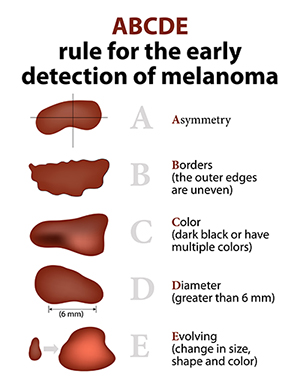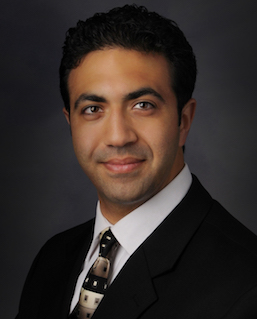About The Condition
 Skin cancer, which develops in the tissues of the skin, is a common form of cancer. Risk factors for developing skin cancer include spending too much time in the sun or in tanning beds and having a family history of skin cancers.
Skin cancer, which develops in the tissues of the skin, is a common form of cancer. Risk factors for developing skin cancer include spending too much time in the sun or in tanning beds and having a family history of skin cancers.
The three most common forms of skin cancer are basal cell cancer in the deeper layer of the skin, squamous cell cancer on the surface of the skin, and melanoma, which is cancer of the cells that make pigment.
Before Surgery
 Prior to your surgery for skin cancer, you may need additional evaluation with imaging studies. Occasionally, some patients are referred to medical or radiation oncologists before surgery to discuss options for non-surgical treatments depending on the type and stage of the skin cancer.
Prior to your surgery for skin cancer, you may need additional evaluation with imaging studies. Occasionally, some patients are referred to medical or radiation oncologists before surgery to discuss options for non-surgical treatments depending on the type and stage of the skin cancer.
In addition you may be asked to:
- Increase your activity. Aim for 30 minutes of walking or other aerobic activity daily to build strength.
- Improve your nutrition. Add protein supplements such as Boost or Ensure to help your body heal after surgery.
- Quit smoking. Smoking impairs healing of your incision and increases your risk of wound complications.
Please ask your physician about any additional steps you should take before your surgery.
Surgery
 Surgery for skin cancer involves removing the area of cancer and underlying fatty tissue as well as a margin of normal-appearing skin and fatty tissue around the cancer. The size of this margin varies based on the type of skin cancer you have, as well as the size of the cancer and its location. This margin is determined to decrease the risk of the cancer coming back or recurring at the same location. The method of closing the incision is based on the size of the area removed as well as the location of the cancer. While most of these areas are closed as a straight line incision with sutures, a small percentage may require a skin graft, where skin is transferred from another part of the body to allow for wound closure. Your surgeon will be able to discuss this in detail at your consultation.
Surgery for skin cancer involves removing the area of cancer and underlying fatty tissue as well as a margin of normal-appearing skin and fatty tissue around the cancer. The size of this margin varies based on the type of skin cancer you have, as well as the size of the cancer and its location. This margin is determined to decrease the risk of the cancer coming back or recurring at the same location. The method of closing the incision is based on the size of the area removed as well as the location of the cancer. While most of these areas are closed as a straight line incision with sutures, a small percentage may require a skin graft, where skin is transferred from another part of the body to allow for wound closure. Your surgeon will be able to discuss this in detail at your consultation.
In addition to removing the cancer in the skin and a margin of normal-appearing tissue, your surgeon may discuss removing a lymph node sample at the time of surgery for some skin cancers based on characteristics noted at the time of your initial biopsy. Your surgeon will discuss this with you at your consultation, if it applies to you.
After Surgery
- You will be encouraged to walk to prevent blood clots, muscle weakness and constipation.
- You may experience constipation. If so, you may take a laxative such as Miralax or Milk of Magnesia.
- Ice may help to reduce the swelling for the first 48 to 96 hours. Then use heat to ease muscle soreness and relax tight muscles.
- Ask your surgeon before taking ibuprofen. A small amount of bleeding or drainage is expected from the wound during the first one or two days.
- Discuss showering and wound care plans with your surgeon, as these vary based on the method used to close your incision.
- Always talk to your surgeon about weight restrictions and return-to-work options.
- You will be asked to see your surgeon in one to three weeks after surgery.
- If you notice a fever greater than 101 degrees Fahrenheit or drainage from your wound, let your surgeon know by calling 763.780.6699.
- You may be referred to an oncologist for follow-up after surgery.
- You will need close follow up with regular full skin examinations by your surgeon or a dermatologist after your treatment.
If you have additional questions, please contact us at 763.780.6699.










